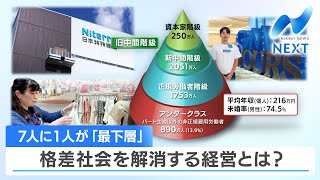Waseda University Professor Hashimoto of the Faculty of Human Sciences has categorized modern Japanese society into five classes, identifying non-regular workers (excluding part-time housewives) as the underclass. This group, which numbers approximately 8.9 million, represents roughly one in seven of the employed population.
The average annual income for this underclass is around 2 million yen. More than 70% of men in this group remain unmarried, largely because they are unable to support household formation and child-rearing.
One key factor behind the rise of this underclass is corporate labor practices. From fiscal 2014 to 2024, Japanese companies significantly increased retained earnings; however, wages have remained largely flat. Over the past two decades, non-regular employees have earned only 60% to 70% of the wages of regular employees, with little indication that this wage gap is narrowing.
The expansion of lower-paid non-regular positions has entrenched economic insecurity. This situation discourages consumption and child-rearing and fuels educational disparities that could ultimately undermine Japan’s competitiveness and long-term economic growth.
To address these divides, companies are being urged to adopt inclusive management practices that leave no one behind. Improving conditions for non-regular workers is essential. Equally important is strengthening the potential of mid-career hires from the so-called “employment ice age” generation, as well as senior workers.
Some companies have already begun making positive changes. For example, Aeon Retail has introduced new leadership positions for non-regular staff and offers bonuses, regional allowances, and retirement benefits on an hourly basis equivalent to those of full-time employees.
Security firm ALSOK Saitama has raised the maximum hiring age for full-time employees to 59, creating more opportunities for older workers. At NGK Insulators, senior employees’ wages are now tied to clear performance standards, enabling them to earn pay levels on par with active managers.
These initiatives highlight a growing recognition that inclusive and fair employment practices are critical for Japan’s social and economic future.
https://newsonjapan.com/article/147033.php


